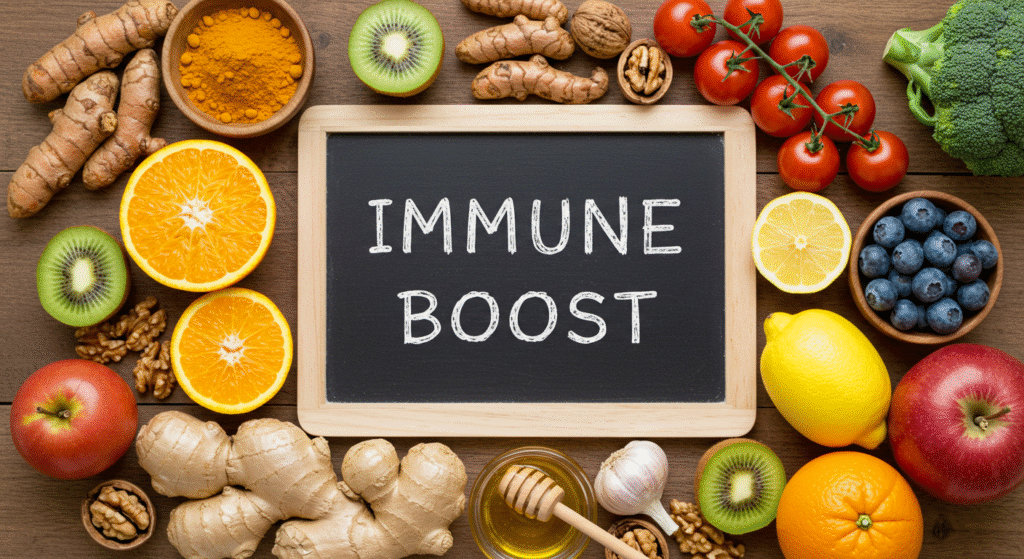Why Your Immune System Deserves Extra Care
Imagine your body as a fortress, surrounded by walls of defense and guarded by vigilant warriors. Your immune system is that security team. It protects you from invaders—whether they’re viruses, bacteria, or other microscopic party crashers. But here’s the tricky part: unlike a fortress wall that just stands there, your immune system adapts, learns, and changes depending on how you care for it.
With modern life crammed full of stress, poor sleep, processed food, and a tendency to binge dramas instead of broccoli (no judgment), your defenses can get sluggish. The good news? You can strengthen your immune system naturally. No magic pills or quick-fixes—just consistent lifestyle choices rooted in science and common sense.
In this guide, you’ll learn exactly what to eat, how to move, when to rest, and which daily rituals truly improve immune health. We’ll bust myths, share practical examples, and break everything into easy, actionable strategies.
By the end, you won’t feel overwhelmed—you’ll feel empowered, knowing how to nurture a resilient body that can stand tall against everyday challenges.
What Is the Immune System and How Does It Really Work?
Before throwing kale smoothies and yoga mats at the problem, it helps to understand the basics.
- Innate immunity: Your body’s frontline defense—skin, mucous membranes, stomach acid, and quick-response cells that tackle intruders immediately.
- Adaptive immunity: Your specialized troops—white blood cells (like T-cells and B-cells). They remember past battles (hello, vaccines!) and target invaders more precisely.
- Balance matters: Too weak, and you catch everything. Too overactive (autoimmunity), and your system attacks you.
So boosting your immune system isn’t about cranking it on turbo mode—it’s about fine-tuning. Think orchestra conductor, not drill sergeant. Balance, not excess, is the goal.
Which Foods Naturally Strengthen the Immune System?
1. Why are fruits and vegetables immune superheroes?
Plants are loaded with vitamins, minerals, fiber, and antioxidants. These nutrients help immune cells communicate, reduce inflammation, and improve your overall resilience.
- Citrus fruits (oranges, lemons, grapefruit): High in vitamin C for white blood cell function.
- Bell peppers: Surprisingly higher in vitamin C than oranges.
- Spinach, kale, broccoli: Nutrient-dense, rich in vitamin A, C, and antioxidants.
- Blueberries and pomegranates: Contain flavonoids that protect cellular health.
2. How does protein support immunity?
Your body uses protein to build antibodies. Without enough, immunity takes a nosedive.
- Lean meats, fish, eggs – great sources of complete protein.
- Legumes, quinoa, nuts, and seeds – plant-based options rich in amino acids.
3. Should you include healthy fats?
Absolutely. Omega-3s help reduce chronic inflammation, the sneaky enemy of immunity.
- Sources: Salmon, sardines, chia seeds, flaxseeds, walnuts, olive oil.
4. Are fermented foods worth it?
Yes—because your gut microbiome is like a command center for immunity. Friendly bacteria in your gut “train” immune cells to distinguish friend from foe.
- Examples: Yogurt (look for live cultures), kefir, kimchi, sauerkraut, miso.
Practical tip: Instead of obsessing over superfoods, focus on diversity. Each colorful fruit or veggie adds new immune tools to your body’s toolbox.
Can Hydration and Herbal Teas Help the Immune System?
Water is an underrated hero. Proper hydration:
- Keeps mucous membranes moist (your first line of defense).
- Flushes toxins.
- Maintains lymph flow, transporting immune cells where needed.
Immune-friendly beverages:
- Green tea: Rich in catechins, antioxidants that support immune activity.
- Ginger tea: Natural anti-inflammatory.
- Turmeric tea (golden milk): Contains curcumin, a compound with immune-modulating properties.
Avoid too much sugar-laden drinks—excess sugar can suppress white blood cell efficiency for hours.
How Does Sleep Impact Immunity?
Think of sleep as your immune system’s nightly maintenance shift. During deep sleep, your body releases cytokines—proteins crucial for fighting infections and regulating inflammation. Skimp on sleep, and cytokine production drops, leaving you vulnerable.
Sleep hygiene tips for stronger immunity:
- Stick to consistent sleep/wake times (yes, even weekends).
- Keep your room cool and dark.
- Ditch screens 30–60 minutes before bed (your immune system enjoys blue light about as much as a cat enjoys baths).
- Build a calming routine—stretching, reading, journaling, or soft music.
Aim for 7–9 hours nightly. It’s not laziness; it’s tactical immune training.
Can Exercise Really Strengthen the Immune System Naturally?
Absolutely—but balance is key. Regular moderate exercise mobilizes immune cells and reduces inflammation. Overtraining, however, can suppress immunity.
- Moderate activities: Brisk walking, cycling, swimming, yoga, strength training.
- Ideal duration: 30–45 minutes, 4–5 days a week.
- Why it works: Physical activity boosts circulation, moving immune cells more efficiently around the body.
Pro tip: If you’re sweating buckets on a treadmill and then collapsing in exhaustion, your immune system is filing HR complaints. Opt for consistency over intensity.
How Does Stress Affect the Immune System?
Ever noticed how you catch a cold right after a stressful project? That’s cortisol—the stress hormone—suppressing your defenses. Chronic stress disrupts immune cell communication and opens the door for infections.
Stress-busting strategies that work:
- Mindfulness meditation (10 minutes daily can lower cortisol).
- Breathing exercises (box breathing or 4-7-8 technique).
- Journaling – helps process emotions before they snowball.
- Spending time outdoors – sunlight + fresh air = stress relief + vitamin D.
Humor is also medicine. Laughing literally reduces stress hormones while boosting circulation—the immune system’s equivalent of a coffee break with a friend.
Does Vitamin D Play a Special Role in Immunity?
Yes. Unlike many vitamins, Vitamin D acts like a hormone, directly influencing immune cell performance. Low levels are linked to higher infection risk.
Ways to increase Vitamin D naturally:
- Sunlight exposure: Aim for 10–20 minutes daily (subject to skin type and location).
- Foods: Fatty fish, fortified dairy, mushrooms.
- Supplements: Consider only if levels are clinically low (get tested first).
Can Healthy Habits Prevent Colds and Infections Long-Term?
Often, yes. While you can’t dodge every germ (unless you plan to live in a bubble), strengthening immunity helps reduce frequency, duration, and severity of illness. Key preventive habits include:
- Wash hands regularly.
- Limit alcohol (excess strains the body).
- Avoid smoking (tobacco weakens immune defenses).
- Environmental hygiene: clean frequently touched surfaces.
How Important Is Social Connection for Immunity?
Believe it or not, loneliness impacts your immune system like junk food for the soul. Studies show people with strong social ties recover faster from illnesses.
- Schedule time with friends and family.
- Combine socializing with immune boosters—like going on a walk, cooking a healthy meal together, or joining a group class.
Your immune system perks up when you feel connected. Humans aren’t wired to thrive in isolation (despite our Amazon Prime memberships).
Immune-Boosting Daily Checklist
Here’s a practical summary you can stick on your fridge:
- Eat colorful fruits and veggies (aim for 5–7 servings daily).
- Stay hydrated with water and herbal teas.
- Sleep 7–9 hours nightly.
- Exercise moderately most days.
- Manage stress through mindfulness and movement.
- Get responsible sunlight exposure for vitamin D.
- Nurture relationships and laugh more.
Think of these seven points as daily deposits into your immune “bank account.”
FAQs on Boosting Immunity Naturally
Q1: Can supplements replace food for immune health?
Supplements can help fill gaps, but real immunity thrives on whole foods packed with synergistic nutrients. Supplements should complement, not substitute.
Q2: How quickly can I strengthen my immune system?
Some changes (like better hydration) have almost immediate effects, while others (like improved sleep, diet, and stress management) build resilience over weeks or months.
Q3: Does sugar really weaken the immune system?
Yes. Studies show excess sugar can impair white blood cell activity for several hours. Occasional treats are fine—but don’t fuel your immune system on cupcakes alone.
Q4: Should kids follow the same immune-boosting tips?
Generally yes—nutritious food, active play, good sleep, and reduced stress benefit kids’ immunity as much as adults, though portion sizes and needs vary.
Q5: Can natural methods prevent serious diseases completely?
No method guarantees immunity from serious illness, but healthy lifestyle choices significantly reduce overall risk and severity.
Q6: Are “immune-boosting” products on the market legit?
Some may help, but many are gimmicky. Look for evidence-based supplements (like vitamin D or probiotics if deficient) rather than trendy miracle cures.
Conclusion: Becoming the Best Ally for Your Immune System
Your immune system is working around the clock, even when you’re not thinking about it—a silent guardian fending off countless threats. The best gift you can give it is consistent support through diet, sleep, activity, stress management, and connection.
No, you don’t need exotic powders from distant jungles or hermit-level quarantine measures. True immunity comes from everyday choices—the food on your plate, the quality of your rest, and even the laughter you share.
So start today: drink water, eat some vibrant produce, spend ten minutes outside, and call a loved one. Those simple actions are your natural immunity boosters.
💬 If this guide helped you, share it with someone who sneezes suspiciously often—and let’s spread resilience instead of colds.

